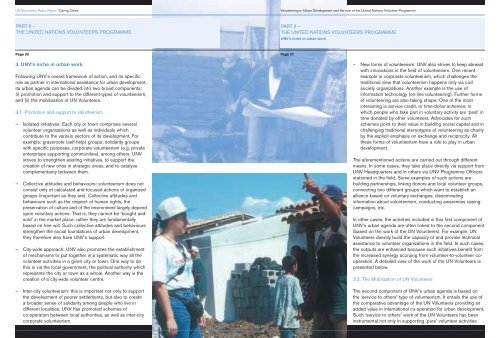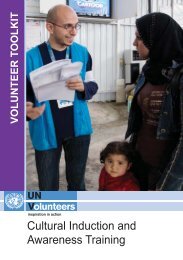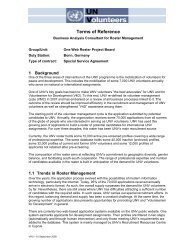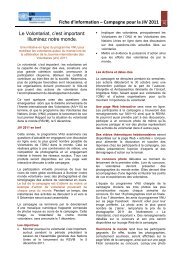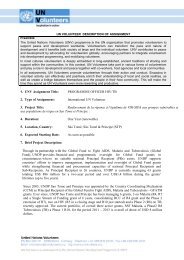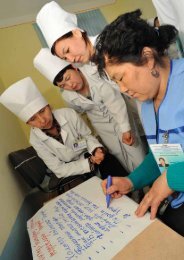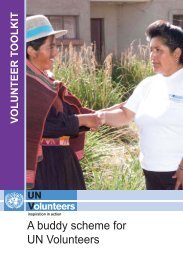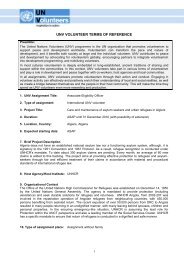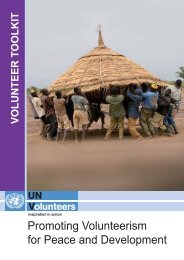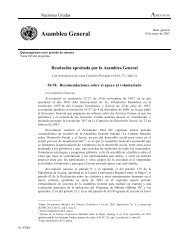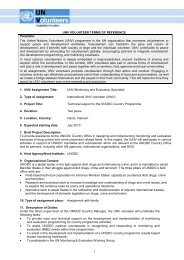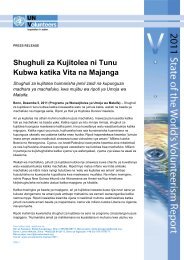View associated PDF document - United Nations Volunteers
View associated PDF document - United Nations Volunteers
View associated PDF document - United Nations Volunteers
You also want an ePaper? Increase the reach of your titles
YUMPU automatically turns print PDFs into web optimized ePapers that Google loves.
UN <strong>Volunteers</strong> Policy Paper ‘Caring Cities’<br />
Volunteering in Urban Development and the role of the <strong>United</strong> <strong>Nations</strong> Volunteer Programme<br />
PART II –<br />
THE UNITED NATIONS VOLUNTEERS PROGRAMME<br />
PART II –<br />
THE UNITED NATIONS VOLUNTEERS PROGRAMME<br />
UNV’s niche in urban work<br />
Page 30<br />
3. UNV’s niche in urban work<br />
Following UNV’s overall framework of action, and its specific<br />
role as partner in international assistance for urban development,<br />
its urban agenda can be divided into two broad components:<br />
(i) promotion and support to the different types of volunteerism,<br />
and (ii) the mobilization of UN <strong>Volunteers</strong>.<br />
3.1. Promotion and support to volunteerism<br />
– Isolated initiatives: Each city or town comprises several<br />
volunteer organizations as well as individuals which<br />
contribute to the various sectors of its development. For<br />
example: grassroots (self-help) groups; solidarity groups<br />
with specific purposes, corporate volunteerism (e.g. private<br />
enterprises supporting communities), among others. UNV<br />
strives to strengthen existing initiatives, to support the<br />
creation of new ones in strategic areas, and to catalyse<br />
complementarity between them.<br />
– Collective attitudes and behaviours: volunteerism does not<br />
consist only of calculated and focused actions of organized<br />
groups (important as they are). Collective attitudes and<br />
behaviours such as the respect of human rights, the<br />
preservation of culture and of the environment largely depend<br />
upon voluntary actions. That is, they cannot be ‘bought and<br />
sold’ in the market place, rather they are fundamentally<br />
based on free will. Such collective attitudes and behaviours<br />
strengthen the social foundations of urban development,<br />
they therefore also have UNV’s support.<br />
– City-wide approach: UNV also promotes the establishment<br />
of mechanisms to put together in a systematic way all the<br />
volunteer activities in a given city or town. One way to do<br />
this is via the local government, the political authority which<br />
represents the city or town as a whole. Another way is the<br />
creation of a city-wide volunteer centre.<br />
– Inter-city volunteerism: this is important not only to support<br />
the development of poorer settlements, but also to create<br />
a broader sense of solidarity among people who live in<br />
different localities. UNV has promoted schemes of<br />
co-operation between local authorities, as well as inter-city<br />
corporate volunteerism.<br />
Page 31<br />
– New forms of volunteerism: UNV also strives to keep abreast<br />
with innovations in the field of volunteerism. One recent<br />
example is corporate volunteerism, which challenges the<br />
traditional view that volunteerism happens only via civil<br />
society organizations. Another example is the use of<br />
information technology (on-line volunteering). Further forms<br />
of volunteering are also taking shape. One of the most<br />
interesting is service credit, or time-dollar schemes, in<br />
which people who take part in voluntary activity are ‘paid’ in<br />
time donated by other volunteers. Advocates for such<br />
schemes point to their value in building social capital and in<br />
challenging traditional stereotypes of volunteering as charity<br />
by the explicit emphasis on exchange and reciprocity. All<br />
these forms of volunteerism have a role to play in urban<br />
development.<br />
The aforementioned actions are carried out through different<br />
means. In some cases, they take place directly via support from<br />
UNV Headquarters and in others via UNV Programme Officers<br />
stationed in the field. Some examples of such actions are:<br />
building partnerships, linking donors and local volunteer groups,<br />
connecting two different groups which want to establish an<br />
alliance based on voluntary exchanges, disseminating<br />
information about volunteerism, conducting awareness raising<br />
campaigns, etc.<br />
In other cases, the activities included in this first component of<br />
UNV’s urban agenda are often linked to the second component<br />
(based on the work of the UN <strong>Volunteers</strong>). For example, UN<br />
<strong>Volunteers</strong> directly build the capacity of and provide technical<br />
assistance to volunteer organizations in the field. In such cases,<br />
the outputs are enhanced because such initiatives benefit from<br />
the increased synergy accruing from volunteer-to-volunteer cooperation.<br />
A detailed view of the work of the UN <strong>Volunteers</strong> is<br />
presented below.<br />
3.2. The Mobilization of UN <strong>Volunteers</strong><br />
The second component of UNV’s urban agenda is based on<br />
the ‘service to others’ type of volunteerism. It entails the use of<br />
the comparative advantage of the UN <strong>Volunteers</strong> providing an<br />
added value in international co-operation for urban development.<br />
Such ‘service to others’ work of the UN <strong>Volunteers</strong> has been<br />
instrumental not only in supporting ‘pure’ volunteer activities


